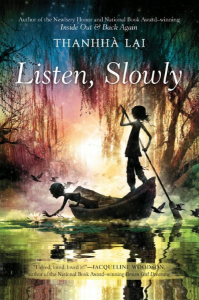Spring 2015 Publishers’ Preview: Five Questions for Thanhhà Lai
This interview originally appeared in the March/April 2015 Horn Book Magazine as part of the Spring Publishers’ Preview, a semiannual advertising supplement that allows participating publishers a chance to each highlight a book from its current list.

This interview originally appeared in the March/April 2015 Horn Book Magazine as part of the Spring Publishers’ Preview, a semiannual advertising supplement that allows participating publishers a chance to each highlight a book from its current list. They choose the books; we ask the questions.
Sponsored by![]()
Thanhhà Lai’s first novel, Inside Out & Back Again, was set forty years ago in the aftermath of the war in Vietnam; Listen, Slowly takes us to her country of birth today.
 1. What is the most surprising difference between the Vietnam of your childhood and how it is now?
1. What is the most surprising difference between the Vietnam of your childhood and how it is now?TL: As a child, I felt nurtured in a bubble of belonging. I knew how to bargain for snacks, how to yell slang on the playground, how to rank first in class. When I visit now, I, of course, still look Vietnamese, but my voice, gestures, poses, stares — all belong to what locals call “a person from over there.”
2. Inside Out & Back Again was a verse novel. What was it like to write in a more conventional (albeit present-tense) form?
TL: Writing was quite easy because I hid behind Mai, my main character. As a girl fully acclimated to Southern California, Mai thinks in slangy, beach-girl sentences, thus lending her voice to prose. For me, the character dictates the form.
 3. How do you talk about your childhood with your own child?
3. How do you talk about your childhood with your own child?TL: I do it constantly and naturally, not as weighty history lessons but as storytelling about what I did, ate, thought when I was her age. Every parent tells stories; mine just happen to have occurred across the world, inside a war.
4. What sense do you have of how today’s American children regard the Vietnam War, which took place during their grandparents’ youth?
TL: From my school visits, it seems middle graders know there once was a war the Americans fought in a distant land called Vietnam. But the specifics of why and how do not consume them. Understandably, the war has nothing to do with their daily lives.
5. Listen, Slowly describes the difficulty its heroine has in learning to speak Vietnamese. What was the most difficult thing for you in learning to speak English?
TL: English verb tenses, so numerous and convoluted, still drive me insane. One consolation: at least verbs in English score much lower on the pain meter than those in French.
Sponsored by![]()
RELATED
RECOMMENDED
ALREADY A SUBSCRIBER? LOG IN
We are currently offering this content for free. Sign up now to activate your personal profile, where you can save articles for future viewing.







Add Comment :-
Be the first reader to comment.
Comment Policy:
Comment should not be empty !!!